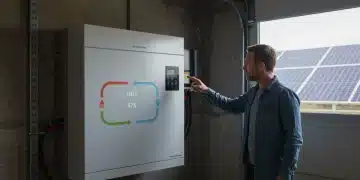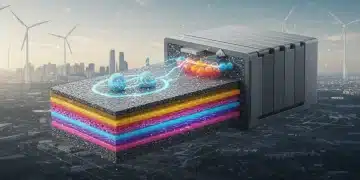Solar power innovations 2025: what to expect this year

Solar power innovations in 2025 focus on increased efficiency, smart technology integration, and significant savings on energy bills, driving widespread adoption and advancements in sustainability.
Solar power innovations 2025 promise exciting advancements that can impact how we harness renewable energy. Have you ever wondered how these innovations might change your energy consumption?
Latest breakthroughs in solar technology
Recent years have seen remarkable breakthroughs in solar technology. These innovations are not only enhancing energy efficiency but also paving the way for a sustainable future. Understanding these advancements can help us appreciate the significant impact solar energy can have on our lives.
Emerging technologies
New technologies are continually being developed to maximize solar power generation. For instance, innovations in photovoltaic cells are generating more energy under different lighting conditions. These cells now feature enhanced absorption rates, making them more efficient.
Energy storage enhancements
The ability to store solar energy is just as crucial as generating it. Researchers are working on more effective battery technologies. Lithium-sulfur batteries offer greater capacity and longer lifespans compared to traditional options. Such improvements only enhance the viability of solar energy in everyday life.
- Technologies improving energy capture
- Advances in solar panel design
- Integration with smart home systems
- Government incentives boosting solar adoption
As these technologies evolve, we also see significant enhancements in solar panel design. New designs are not only sleeker but also more effective in generating energy. Integrating solar panels into buildings is becoming a norm, thanks to architectural advancements.
Furthermore, the solar industry is embracing smart technology. This integration allows us to monitor and manage energy use more effectively. Smart solar systems can optimize energy production based on real-time data, offering a user-friendly experience.
With such rapid advancements, the future of solar power looks promising. The latest breakthroughs are making solar energy a more appealing choice for both consumers and businesses.
Impact of solar power on energy bills

The impact of solar power on energy bills is significant and often quite positive. Many homeowners and businesses are discovering how solar energy can lead to substantial savings. This trend is not just a passing phase; it represents a long-term solution for reducing energy costs.
Understanding savings
When you install solar panels, you begin generating your own electricity. This can lead to lower monthly bills, depending on your energy consumption and the size of your solar system. By harnessing the sun’s energy, users can drastically reduce their reliance on grid power, especially during peak hours.
Tax incentives and rebates
Another way solar power can affect energy costs is through various tax incentives and rebates available for solar panel installations. These financial benefits can greatly reduce the upfront costs of installing solar systems.
- Federal tax credits for solar energy systems
- State and local rebates
- Net metering policies that credit solar users
- Incentives for energy-efficient upgrades
Additionally, it’s essential to consider the rising utility rates. As these rates increase, the savings from solar power become even more pronounced. With a fixed solar payment plan, homeowners can protect themselves from future price hikes in energy.
Many people report that after going solar, they’ve experienced a significant drop in their energy bills. This trend is not only beneficial for individuals but also for the environment. As more homes adopt solar energy, the collective impact on energy demand can lead to a more sustainable future.
Furthermore, local incentives and community programs can enhance the savings from solar energy. Some areas offer special financing options, allowing users to save even more on their energy bills while supporting renewable energy initiatives.
Top companies leading solar innovations
Several top companies leading solar innovations are driving the future of renewable energy. These organizations are dedicated to research and technology development, making significant contributions that impact the solar market worldwide. Their advancements not only improve solar technology but also promote sustainability.
Key players in the industry
Among the leaders, companies like SunPower, First Solar, and Tesla stand out. Each of these companies is known for its unique approach to solar energy and its commitment to innovation.
SunPower’s advanced technology
SunPower focuses on higher-efficiency solar panels, utilizing cutting-edge technology that enhances energy output. Their products are increasingly popular for residential installations due to their long lifespan and robust performance.
- High-efficiency solar panels
- Durability and performance
- Innovative energy solutions
- Commitment to sustainability
Next, First Solar specializes in thin-film solar technology. By using unique materials, they produce solar panels that require less energy to manufacture and are more environmentally friendly.
At the same time, Tesla is revolutionizing the market with its energy storage solutions and solar roof tiles. These products allow homeowners to efficiently use solar energy and store excess power for later use. Tesla’s approach merges technology with design, appealing to a broader audience.
Moreover, these companies continuously invest in research and development. They strive to improve solar energy systems, making them more affordable and accessible. As a result, the solar industry is expected to grow rapidly, thanks to the innovations brought forth by these leading firms.
By 2025, we can expect even more revolutionary products and services that will further integrate solar energy into everyday life.
Future trends in solar energy adoption

The future trends in solar energy adoption look promising, with numerous factors contributing to a growing shift toward renewable energy solutions. As technology advances, more people are considering solar energy for their homes and businesses.
Increased efficiency
One trend is the continuous improvement in solar panel efficiency. New technologies are emerging, enabling solar panels to convert more sunlight into energy. These advancements make solar energy more appealing to consumers, as they can produce more energy in limited space.
Smart solar systems
Another trend is the rise of smart solar systems. These systems integrate with home automation technology, allowing users to manage energy usage better. Homeowners can monitor their solar energy production and consumption through apps, giving them more control over their energy habits.
- Real-time energy monitoring
- Automated energy management
- Integration with electric vehicles
- Enhanced grid connectivity
Additionally, as electric vehicle adoption increases, solar energy will play a crucial role in charging sustainable transportation options. People will want to charge their electric vehicles using clean, renewable energy, which can further boost solar energy demand.
Solar energy storage solutions are also gaining traction. Improved battery technologies are making it easier for homeowners to store excess energy for use at night or during cloudy days. This shift will allow for a more reliable and consistent energy supply.
Moreover, many governments are promoting solar energy adoption through incentives and policies. These initiatives encourage consumers to install solar systems, making renewable energy more accessible.
As these trends continue to develop, the adoption of solar energy is set to increase significantly. Consumers are becoming more aware of the benefits of solar energy and are eager to contribute to a sustainable future.
FAQ – Frequently Asked Questions about Solar Power Innovations
What are the main benefits of using solar energy?
Solar energy helps reduce electricity bills, lowers carbon emissions, and increases energy independence for homeowners.
How does solar panel efficiency impact energy savings?
Higher efficiency solar panels capture more sunlight and convert it into electricity, leading to greater energy savings and reduced dependence on the grid.
What incentives are available for solar energy adoption?
Many governments offer tax credits, rebates, and financing options to encourage homeowners and businesses to install solar panels.
What future trends should we expect in solar energy?
Expect advancements in technology, increased smart system integration, and a stronger push for renewable energy policies worldwide.





